In the past, MCC Cambodia parents who were expecting a new child would travel to Thailand and deliver the baby there. I hadn’t thought about it until some MCC alumni asked and we realized that Caleb is likely the first “MCC baby” to be born in Cambodia. I asked Pou Cheang and Ming Ramy, who have been with MCC since 1995, and they confirmed that Caleb is the first MCC expat baby born here. That’s a sign of how healthcare in Cambodia is finally ‘getting there’ after decades of regrowth.
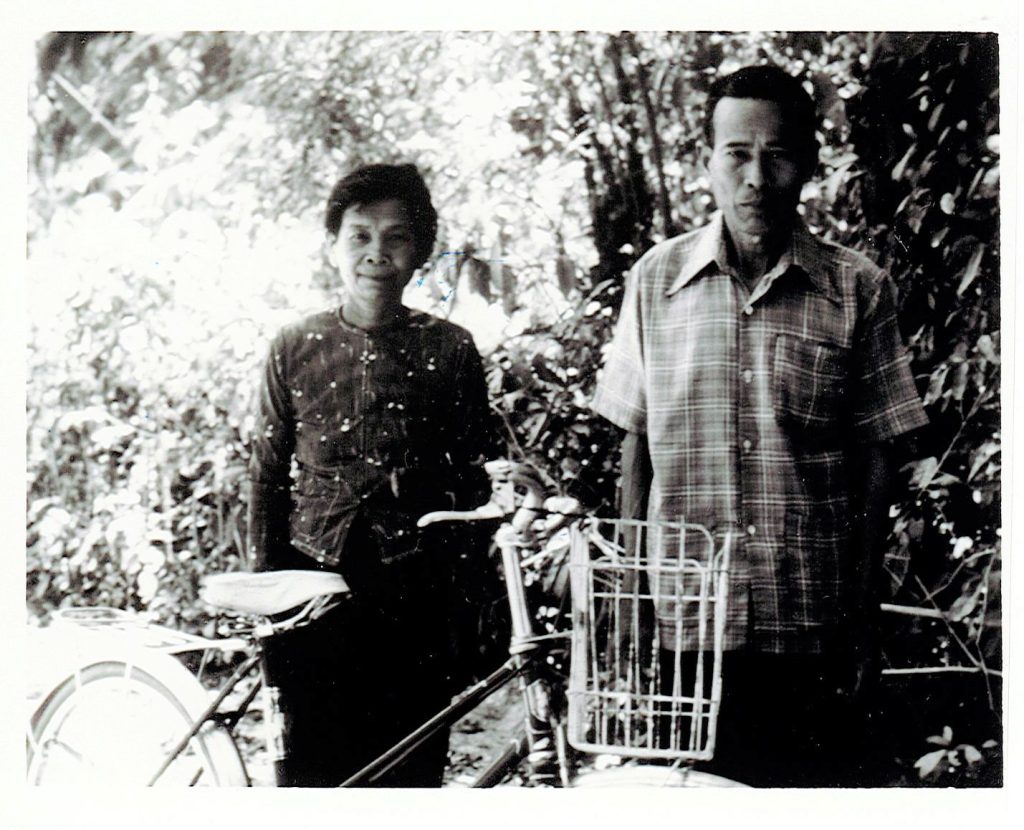
As I’ve shared before, it’s estimated that there were only 25 medical doctors left in the country after the Khmer Rouge’s mass murder of the educated in Cambodia. In the early years, MCC sent medical personnel to treat and teach, as well as supporting traditional birth attendants and midwives with trainings, equipment, and bicycles. In this 1987 photo, a midwife named Phau Yuan and her husband stand by a new MCC-donated bicycle.
Broadly, across much of Asia, Caesarian sections are increasingly becoming the default for middle class and upper class births. There are many factors behind this, including some that might seem strange to North Americans such as wanting to schedule the child’s birth on an auspicious day, but many hospitals and maternity clinics here in Cambodia push for C-sections. Crystal heard from other expat mothers that many hospitals and maternity clinics said vaginal delivery was fine, but then quickly pushed for C-section during labor. We didn’t want to be arguing, during labor, with the Doctor over a vaginal vs C-section delivery. Not that we’re opposed to a C-section but, especially after Catherine’s quick delivery, we didn’t want to be pushed into an unnecessary one.
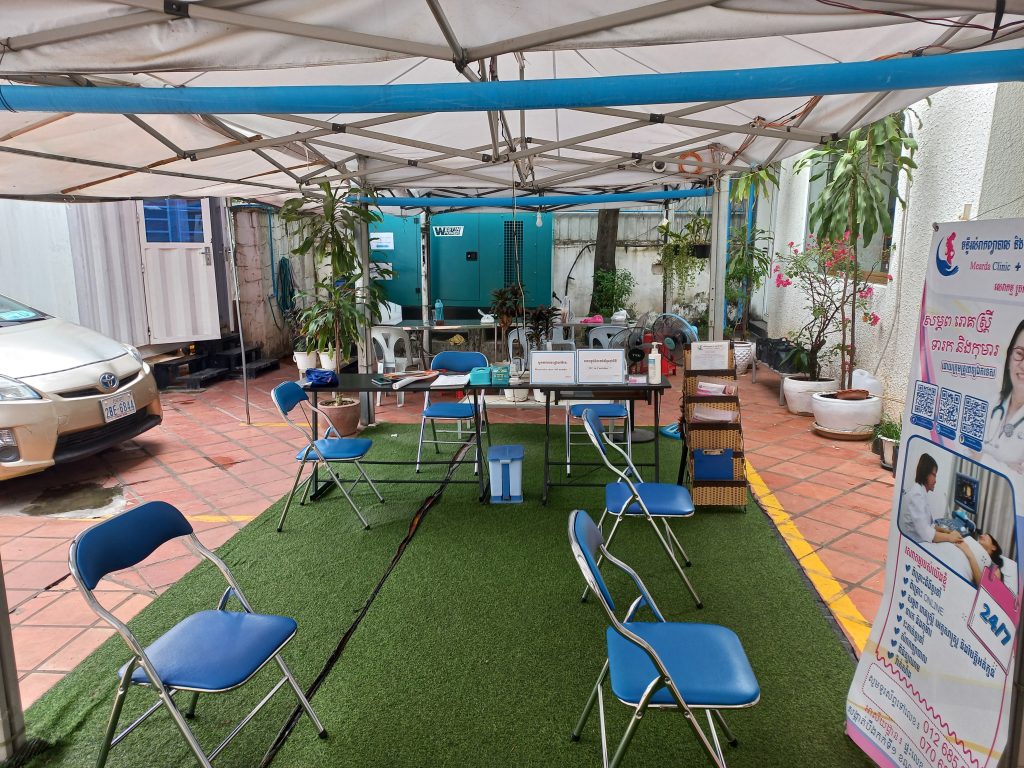
From asking around, Crystal learned that Dr. Sovannaroth Ty had a good reputation among expat mothers and only advocated for C-section when it was medically necessary. After finishing her advanced studies in France, Dr. Ty went to work at Khema Clinic, which we knew well from the medical emergency on our team, but during the COVID-19 years she left for Mearda Maternity Clinic. We live on the southern side of ‘old’ Phnom Penh, in Phsa Deorm Thkov, while Meara is on the northern side of ‘old’ Phnom Penh, in Tuol Kouk. It’s about 45 minutes away in good traffic but could take double that during rush hour. Still we decided to go with Mearda in order to have Dr. Ty as our primary.
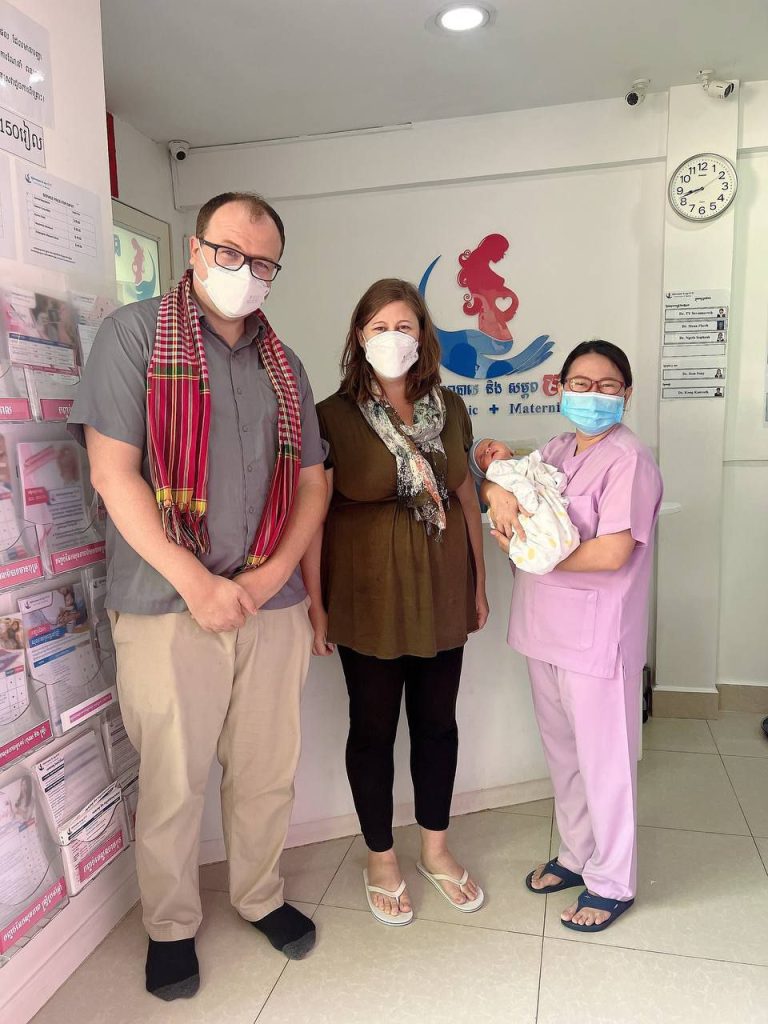
Our experience with Mearda Maternity Clinic very much mirrored our experience with Khema Clinic. Both Dr. Ty and the Doctors at Khema Clinic are Cambodians who completed their advanced studies in other countries; primarily France and Singapore. Both clinics have excellent equipment and caring supportive nursing/midwife staff. The medical staff are highly skilled, professional, and cautious. However, both really struggle on the administrative, organizational, and communication side. We almost switched to a different clinic in December when Mearda repeatedly forgot to schedule/lost our appointments and test results.
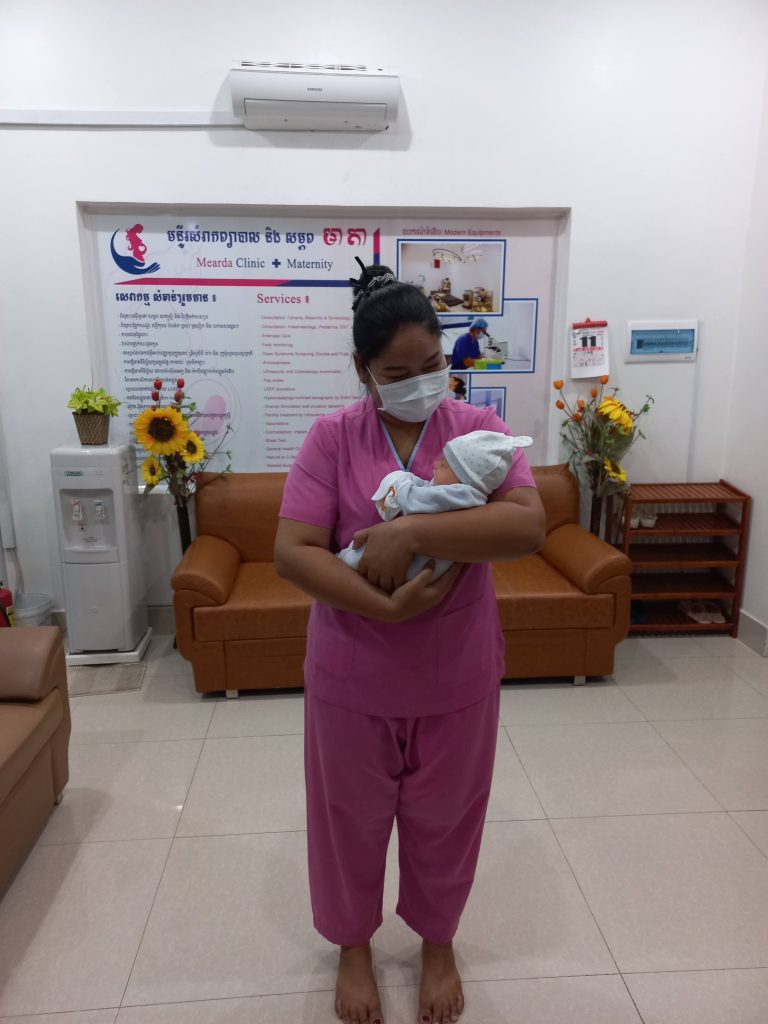
When we arrived for delivery last Thursday, after Crystal’s water had broke, the receiving Doctor whom we had never met before insisted on an ultrasound, since Dr. Ty hadn’t arrived yet, and didn’t seem to know anything about our case. Even though we were the only delivery on the schedule board. They had also lost Crystal’s blood results again and argued with us that we hadn’t done the required blood test to show that Crystal was no longer anemic. They insisted that we do the blood test again, even though we all knew the results wouldn’t be back for two days, and wait to move to the labor room until all the tests were completed. Even though Mearda should have had numerous ways to confirm that we had, indeed, had the blood test; such as checking the schedule, the billing information, or their billing to the testing facility. Clivia, who was watching the girls, was able to send us the blood test results – printed on Mearda letterhead – but then Dr. Ty arrived and it was immediately resolved. Then, during labor, they pulled me out to pay for the ultrasound they had done on arrival – which was outside of the plan we had signed up for (and likely necessary only because the receiving Doctor had absolutely no idea what our situation was). When I tried to pay by card the lady who had pulled me out to pay didn’t know how to work the machine, so no bank transfer or card. Fortunately, I had enough cash on me but it was still a stressful moment.
This was very much like our experience with Khema Clinic, the individual Doctors had excellent technical skills, but there didn’t seem to be a strong avenue for communication between them and they often replicated tests instead of just sharing information between them. At Khema Clinic, during our medical emergency last year, we started keeping a logbook of medical notes on Disha and the Doctors started actually checking that to see what the other Doctors had said/what the test results were.
Once we made it through the administrative logjam the medical care at Mearda during delivery was excellent. They also allowed me and the doula to be in the room. This is something that other hospitals and clinics, including Khema, often do not allow. The mother is on her own with the medical staff or, in some cases, can bring one additional person. But Meara and Dr. Ty, as promised, never pushed back against the two of us being there. Even when the space was cramped due to everyone rushing around after Caleb was delivered.
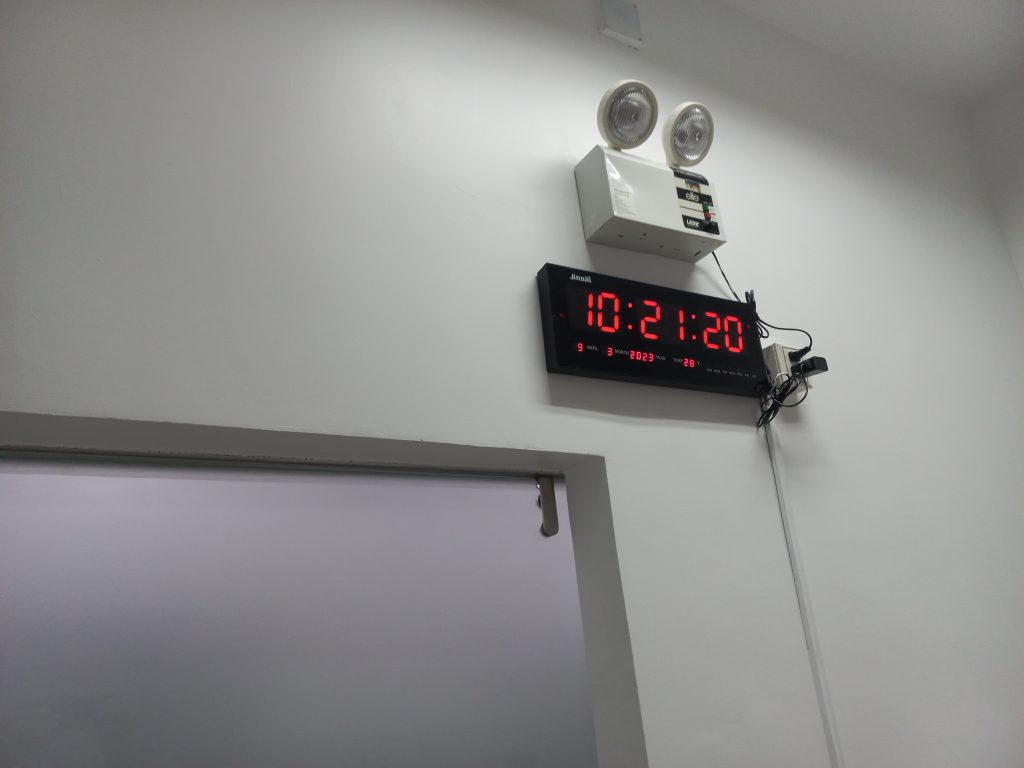
Throughout all of this, we were glad to be supported by an American doula – who runs a business called Susu Birthing – who Crystal had connected with. Erin had been a Peace Corp volunteer in Koh Kong province working in maternal health and decided that she wanted to become a doula, so she trained in India and then returned to Cambodia. She, of course, helped with labor by supporting, massaging, and coaching Crystal. But she also helped us navigate the Cambodian healthcare system and to be prepared for some cultural differences between it and North America. She told us that once she had accompanied a couple to their hospital for delivery, but they had forgotten to bring their folder of paperwork and the receiving Doctor didn’t believe that they had ever been to the hospital before. He argued, while the wife was standing there in labor, that they shouldn’t have come here if they’d never been here before and didn’t believe that they had been there just five days earlier for their last appointment. Finally, the doula convinced the Doctor to look up their record and, sure enough, the mother actually was a patient at the hospital. The lesson she wanted to get across to us was bring your paperwork (which we mostly managed but forgot that last blood test result).
While I speak Khmer but I don’t really know much in the way of healthcare vocabulary. So it was really reassuring and helpful to have a doula who spoke Khmer and knew the medical processes. Especially in those stressful moments of trying to figure out what was going on and what we had to do to keep things moving forward.
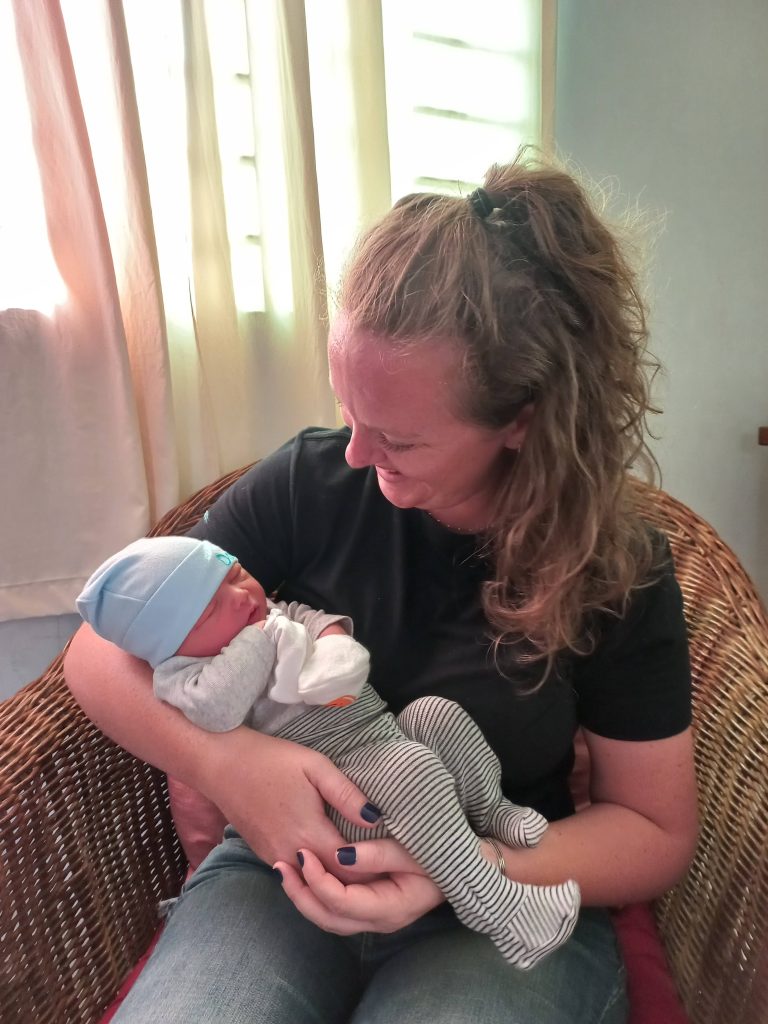
The doula has also helped us navigate the confusing process of registering Caleb as a human being. Hospitals in Cambodia do not issue birth certificates so we have to work through a number of smaller offices in order to get his birth certificate, which we can then use to register him as a US citizen with the Embassy and get his passport. Cambodia does not have birth citizenship so, while Caleb was born in Cambodia, he will not have dual citizenship.
Tips for having a baby in a context like Cambodia
- Connect with an expat mother’s group. In Cambodia, there’s Phnom Penh Mommas on Facebook. The situation is constantly changing and nothing is more reliable than recent personal feedback.
- Often, here, the choice of Doctor is more influential than the choice of Hospital/Clinic. So ask for and follow the Doctor. Don’t give up on your Doctor just because the clinic is disorganized. In Cambodia, we recommend Dr. Ty.
- If possible, find a doula from a culture close to your passport country so they can act as a cultural navigator.
- Bring several payment methods, including cash, and all of your paperwork.
Fascinating story… even though the medical facilities have come a long way it sounds like the admin is a nightmare. I’m one of those expats who had two babies in Thailand. Congrats to both of you! What a saga! Ruth Keidel Clemens
Thanks Ruth! Yes, the administration was a certainly challenge in this case and during our medical emergency last year. But the competence of the Cambodian medical professionals was reassuring in both cases.
Quite an experience…..
WOW! Amazing,
Wow, this is very interesting (me being an RN in a hospital in U.S.A.) and also having lived in Cambodia. Good for you on having the delivery in Phnom Penh! BUT my goodness, the inefficiency of the Cambodian clinics’ systems is something I take for granted here. That sounds like a very frustrating process.
Thanks, Sherry! It was quite different from our experience with our first two in Pennsylvania. But between the stroke and this we’re really getting a handle on the state of healthcare in Cambodia in the 2020s.
Amazing and insightful! Thanks for sharing so many details. I’m glad it all worked out in the end!
Thank you! Mom and baby are healthy, so it all worked out. I hope that sharing the details is helpful to someone else who is thinking about it.
Glad you had the resources to navigate the system at such a stressful time! Glad this was baby #3 instead of your first! Love you all!
Thank you! It was an experience but it all worked out. Caleb and Crystal are healthy, that’s what matters.